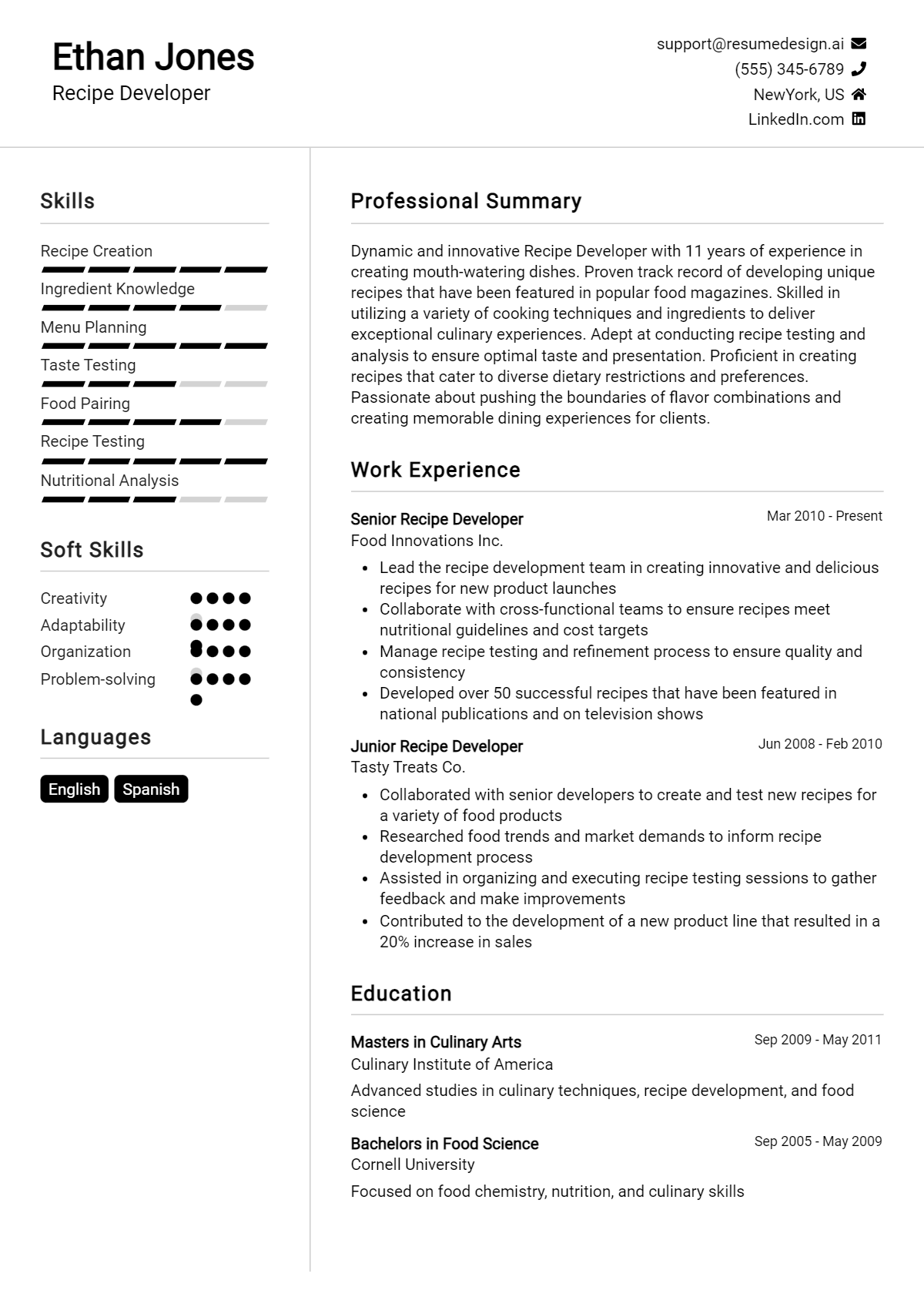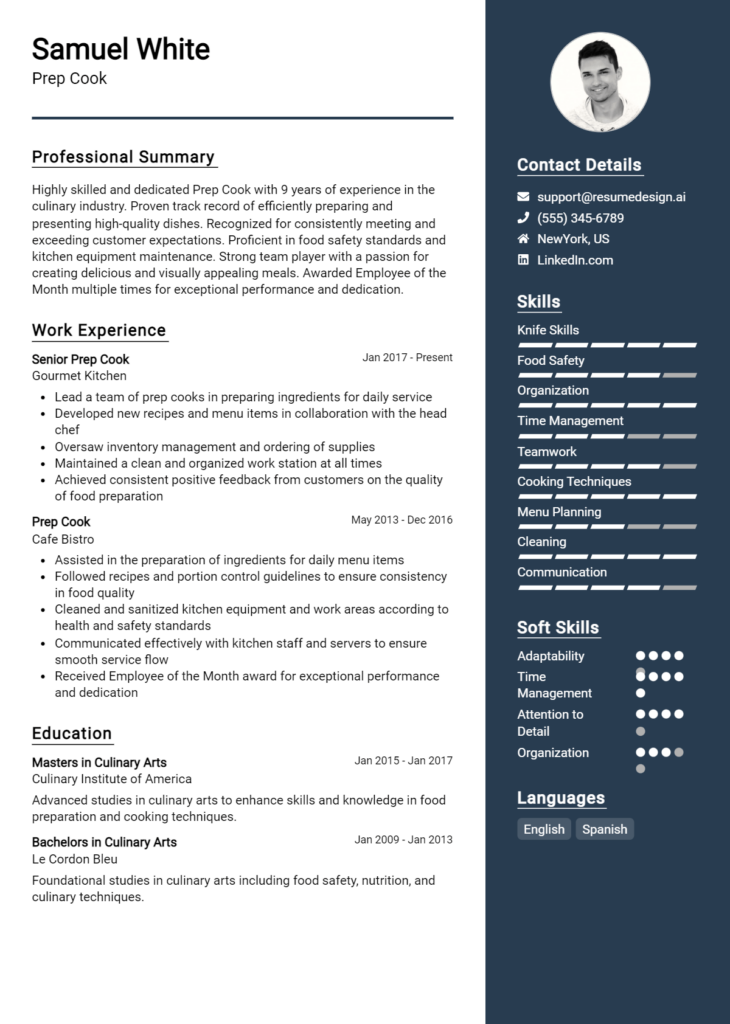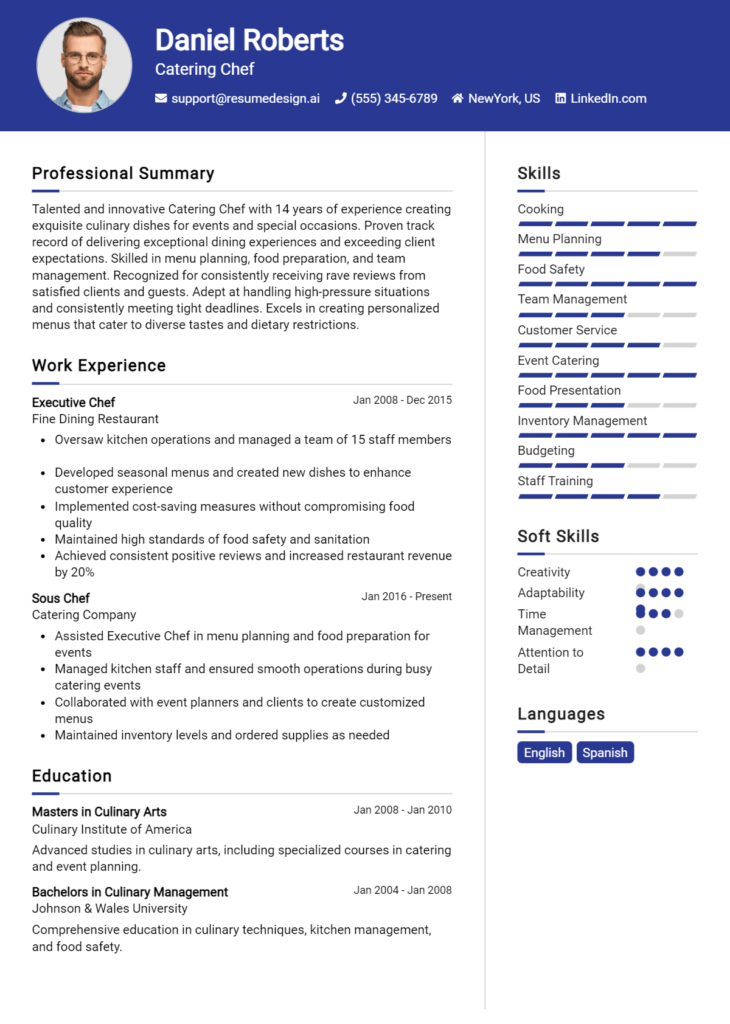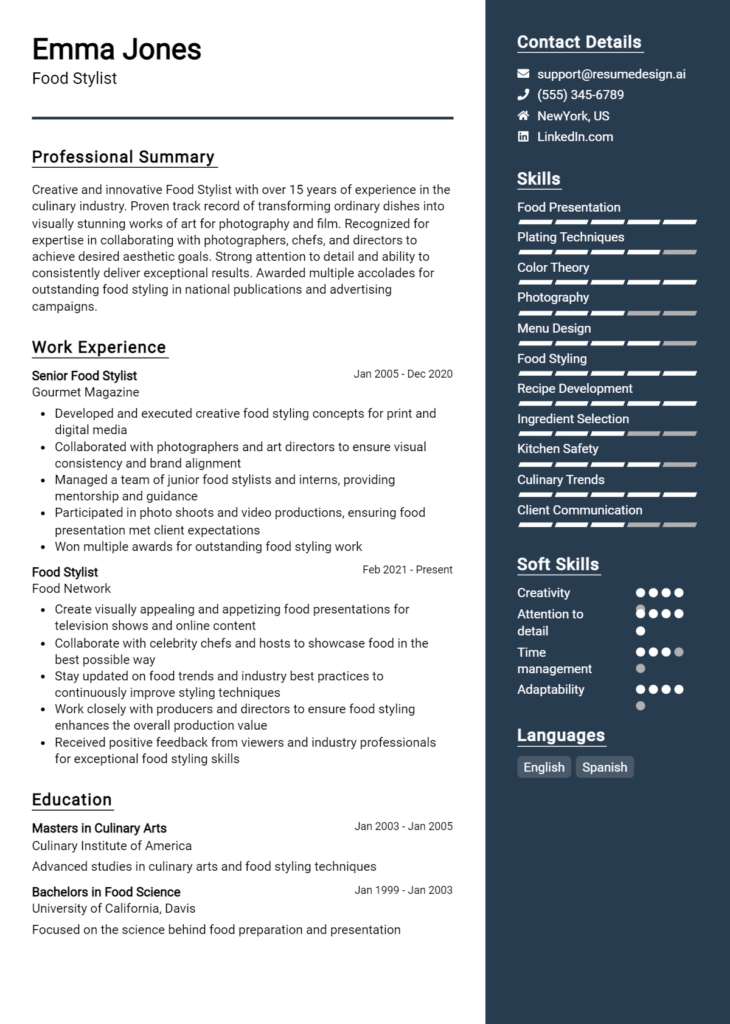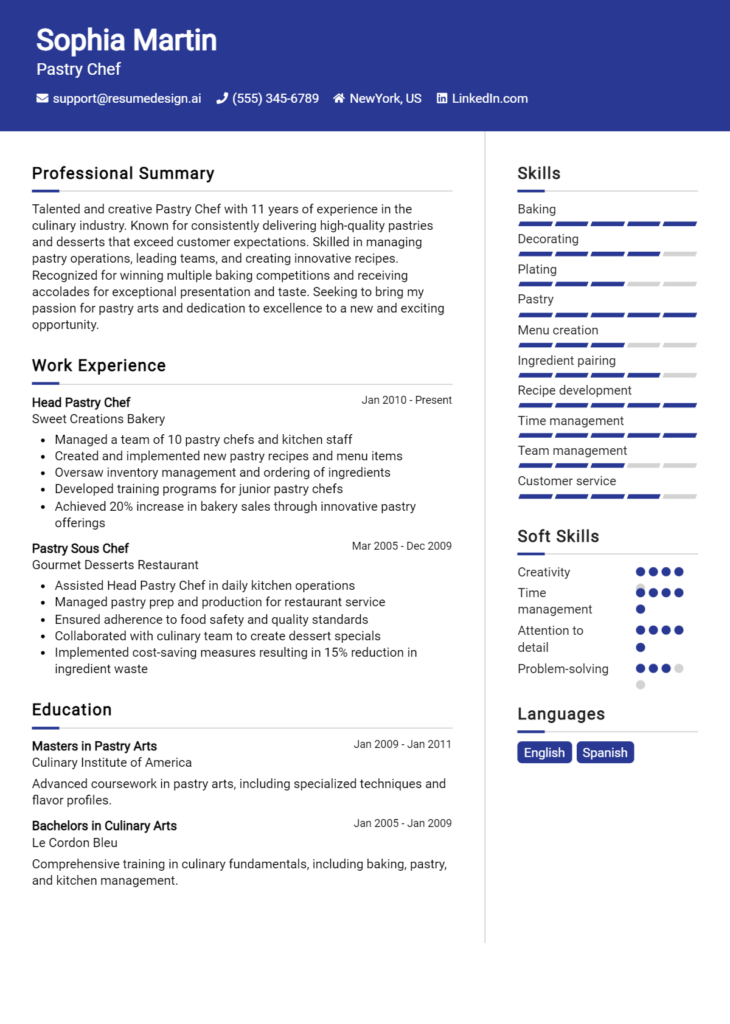Recipe Developer Core Responsibilities
A Recipe Developer plays a crucial role in the culinary industry, blending creativity with technical expertise to create innovative dishes. Key responsibilities include researching food trends, developing recipes that meet specific dietary needs, and collaborating with marketing and production teams to ensure consistency and quality. Essential skills include strong problem-solving abilities, attention to detail, and operational insight. These competencies not only contribute to the organization's success but also enhance a well-structured resume, effectively showcasing a candidate's qualifications.
Common Responsibilities Listed on Recipe Developer Resume
- Developing and testing new recipes for various cuisines.
- Collaborating with chefs and culinary teams to refine dishes.
- Conducting market research to identify food trends.
- Ensuring recipes meet nutritional and dietary standards.
- Documenting and standardizing recipes for production use.
- Evaluating ingredient quality and sourcing suppliers.
- Training staff on new recipes and cooking techniques.
- Analyzing customer feedback to improve recipes.
- Maintaining a well-organized recipe database.
- Participating in product development and marketing strategies.
- Adhering to food safety and sanitation regulations.
High-Level Resume Tips for Recipe Developer Professionals
In the competitive world of culinary arts, a well-crafted resume serves as the initial gateway for Recipe Developer professionals to showcase their creativity and expertise. This document is often the first impression a potential employer encounters, making it crucial to reflect not just skills but also unique achievements that illustrate a candidate's culinary prowess. A strong resume can set a Recipe Developer apart in a crowded job market, demonstrating their ability to innovate and create tantalizing recipes. This guide will provide practical and actionable resume tips specifically tailored for Recipe Developer professionals, enabling them to present their qualifications effectively.
Top Resume Tips for Recipe Developer Professionals
- Tailor your resume to the job description by incorporating relevant keywords and phrases that align with the desired qualifications.
- Highlight your culinary education and any certifications, such as food safety or nutrition, that enhance your credibility.
- Showcase relevant experience by detailing previous roles, responsibilities, and the types of recipes developed.
- Quantify your achievements, such as the number of recipes created, awards won, or increases in customer satisfaction.
- Include a portfolio link or samples of your work to visually demonstrate your recipe development skills.
- Emphasize industry-specific skills, such as knowledge of dietary restrictions, ingredient sourcing, and food trends.
- Use action verbs to describe your contributions, making your accomplishments stand out and resonate with employers.
- Keep the design clean and professional, ensuring that your resume is easy to read and visually appealing.
- Proofread for grammatical errors and typos; a polished resume reflects attention to detail, a critical trait for Recipe Developers.
By implementing these tips, Recipe Developer professionals can significantly enhance their resumes, increasing their chances of landing a job in this dynamic field. A tailored and well-structured resume not only showcases culinary expertise but also conveys a strong personal brand, making candidates more appealing to potential employers.
Why Resume Headlines & Titles are Important for Recipe Developer
In the competitive field of culinary arts, particularly as a Recipe Developer, having a compelling resume headline or title is essential for capturing the attention of hiring managers. A strong headline serves as the first impression, offering a snapshot of a candidate's key qualifications and unique selling points in just a few words. It should be concise, relevant, and directly related to the job being applied for, allowing hiring managers to quickly gauge the candidate's fit for the role. A thoughtfully crafted headline can differentiate a candidate from the crowd, highlighting their expertise and passion for recipe development.
Best Practices for Crafting Resume Headlines for Recipe Developer
- Keep it concise: Aim for one impactful phrase that summarizes your qualifications.
- Be role-specific: Tailor the headline to reflect the Recipe Developer position you are applying for.
- Highlight key strengths: Focus on your most relevant skills or accomplishments.
- Use action-oriented language: Start with strong verbs to convey your proactive approach.
- Avoid jargon: Use clear and straightforward language to ensure understanding.
- Make it memorable: Include unique elements that showcase your personality or style.
- Align with job description: Incorporate keywords from the job posting to enhance relevance.
- Test for impact: Share your headline with peers for feedback on its effectiveness.
Example Resume Headlines for Recipe Developer
Strong Resume Headlines
Creative Recipe Developer with 5 Years of Experience in Vegan Cuisine
Award-Winning Recipe Developer Specializing in Gluten-Free Desserts
Innovative Culinary Expert with Proven Skills in Flavor Pairing and Presentation
Weak Resume Headlines
Looking for a Job in Cooking
Recipe Developer with Some Experience
The strong headlines listed above effectively convey the candidates' specialized skills and experiences, making it clear what they bring to the table. They use specific terms like "Vegan Cuisine" and "Gluten-Free Desserts," which tell hiring managers exactly what the candidate excels at. In contrast, the weak headlines lack specificity and impact, failing to showcase the candidate's qualifications or unique identity. As a result, they do not grab attention or provide a clear picture of what the candidate offers, making them less memorable in a competitive job market.
Writing an Exceptional Recipe Developer Resume Summary
A well-crafted resume summary is essential for a Recipe Developer as it serves as the first impression for hiring managers, quickly showcasing the candidate's key skills, experience, and accomplishments relevant to the culinary field. A strong summary not only captivates attention but also effectively communicates the individual's passion for food innovation and expertise in recipe development. It should be concise, impactful, and tailored to the specific job for which the candidate is applying, ensuring that it resonates with the employer's needs and expectations.
Best Practices for Writing a Recipe Developer Resume Summary
- Quantify achievements to demonstrate impact, such as the number of recipes developed or improvements in customer satisfaction ratings.
- Focus on relevant skills such as creativity, technical cooking skills, and knowledge of food safety regulations.
- Tailor the summary to align with the job description, using keywords that reflect the specific requirements and responsibilities of the role.
- Highlight unique accomplishments, such as awards, successful product launches, or published recipes in reputable publications.
- Keep it concise, aiming for 3-5 sentences that capture the essence of your qualifications without overwhelming the reader.
- Use action verbs to convey a sense of initiative and proactivity, such as 'developed', 'designed', or 'launched'.
- Include a mix of hard and soft skills to provide a well-rounded view of your capabilities.
- Revise and edit your summary for clarity and flow, ensuring that every word adds value to your resume.
Example Recipe Developer Resume Summaries
Strong Resume Summaries
Dynamic Recipe Developer with over 5 years of experience creating innovative dishes that increased customer satisfaction by 30%. Expert in flavor pairing and ingredient sourcing, with a proven track record of launching 50+ successful menu items in fast-paced restaurant environments.
Creative Culinary Artist skilled in recipe formulation and food styling, having won a prestigious culinary award for developing a plant-based menu that boosted sales by 25%. Adept at collaborating with chefs and food scientists to create appealing and nutritious recipes.
Results-driven Recipe Developer with a passion for sustainable cooking, recognized for developing a line of gluten-free products that generated $500,000 in revenue within the first year. Strong background in culinary education and food safety compliance.
Weak Resume Summaries
Experienced cook looking for a job in recipe development. I have worked in various kitchens and have some knowledge of ingredients.
I love cooking and have made many recipes. I am interested in working in a restaurant or food company.
The strong resume summaries are effective because they provide quantifiable outcomes, specific skills, and relevant accomplishments that directly relate to the Recipe Developer role. They demonstrate the candidate's impact in previous positions and offer concrete examples of their culinary expertise. In contrast, the weak summaries are vague and lack detail, making it difficult for hiring managers to assess the candidate's qualifications or potential contributions to their team.
Work Experience Section for Recipe Developer Resume
The work experience section of a Recipe Developer resume is a critical component that highlights a candidate's technical skills, ability to manage teams, and capacity to deliver high-quality products. This section serves as a showcase of past roles and responsibilities, demonstrating not only what the candidate has accomplished but also how these experiences align with industry standards. By quantifying achievements and detailing specific contributions, candidates can effectively illustrate their value and expertise in recipe development, making them stand out in a competitive job market.
Best Practices for Recipe Developer Work Experience
- Emphasize specific technical skills relevant to recipe development, such as ingredient sourcing, flavor profiling, and food safety standards.
- Quantify achievements with metrics, such as percentage increases in customer satisfaction or sales growth tied to new recipes.
- Highlight leadership roles in team projects or collaborations that resulted in successful product launches.
- Detail any experiences with cross-functional teams, showcasing your ability to work with marketing, nutrition, and culinary teams.
- Include relevant certifications or training that enhance your credibility as a recipe developer.
- Use action verbs to convey a sense of initiative and impact, such as "developed," "optimized," or "collaborated."
- Align your experiences with current industry trends to demonstrate your up-to-date knowledge and adaptability.
- Tailor each experience to the specific job you are applying for, focusing on relevant skills and successes.
Example Work Experiences for Recipe Developer
Strong Experiences
- Led a team of 5 in the development of a new line of gluten-free products, resulting in a 30% increase in sales within the first quarter of launch.
- Collaborated with nutritionists to reformulate classic recipes, improving nutritional content by 25% while maintaining flavor integrity.
- Conducted market research that identified consumer trends, leading to the successful introduction of 10 new recipes that boosted brand engagement by 40%.
- Managed the recipe testing process, implementing a streamlined feedback system that reduced development time by 15%.
Weak Experiences
- Worked on various recipes and helped with some testing.
- Assisted in the kitchen with recipe preparation.
- Participated in team meetings to discuss recipe ideas.
- Made some changes to existing recipes as needed.
The examples of strong experiences are considered effective because they are specific, quantifiable, and demonstrate leadership and collaboration, showing tangible results that positively impacted the organization. In contrast, the weak experiences lack detail and measurable outcomes, making them less impactful and failing to clearly communicate the candidate's contributions or skills in recipe development.
Certifications and Education for a Recipe Developer Resume
When crafting a resume as a Recipe Developer, it is essential to effectively highlight your educational background and any relevant certifications. These qualifications can significantly enhance your credibility and demonstrate your expertise in culinary arts, nutrition, and food science. Here are some guidelines on how to list your certifications and education, along with examples of relevant educational backgrounds.
Certifications to Prioritize
- ServSafe Food Handler Certification: This certification is crucial as it demonstrates your understanding of food safety practices, which is vital for any recipe developer.
- Culinary Arts Certification: Completing a culinary arts program can greatly enhance your cooking skills and knowledge of food preparation techniques. Look for programs accredited by reputable institutions.
- Nutrition and Dietetics Certification: If your recipes focus on health and nutrition, having a certification from a recognized organization such as the Academy of Nutrition and Dietetics can be beneficial.
- Specialized Cuisine Certifications: Depending on your area of expertise, certifications in specific cuisines (e.g., Italian, French, or Vegan Cooking) can help distinguish you as a specialist in those fields.
Relevant Educational Backgrounds
- Associate’s or Bachelor’s Degree in Culinary Arts: A degree from a culinary school provides foundational skills in cooking techniques, food preparation, and kitchen management.
- Bachelor’s Degree in Nutrition or Dietetics: This degree is particularly valuable if your recipe development focuses on health-conscious eating, dietary restrictions, or nutritional education.
- Food Science Degree: A degree in food science can offer insights into the chemical processes behind cooking and food preservation, which is beneficial for developing innovative recipes.
- Hospitality Management Degree: While not strictly culinary, this degree can provide insights into the business side of food, including menu development and culinary trends, which can enhance recipe development skills.
When listing your certifications and education on your resume, be sure to include the name of the institution, the type of degree or certification, and the year of completion. This will provide potential employers with a clear understanding of your qualifications and expertise in the field of recipe development.
Top Skills & Keywords for Recipe Developer Resume
In the competitive field of recipe development, showcasing the right skills on your resume is crucial for standing out to potential employers. A well-crafted resume not only highlights your culinary creativity but also demonstrates your ability to translate ideas into delicious, shareable recipes. Both hard and soft skills play a vital role in this process. Hard skills reflect your technical expertise and knowledge of culinary techniques, while soft skills highlight your interpersonal abilities, creativity, and adaptability. Together, these skills provide a comprehensive view of your qualifications, making it essential to articulate them effectively. For those interested in refining their resume, exploring skills and work experience sections will enhance your chances of capturing attention in the culinary job market.
Top Hard & Soft Skills for Recipe Developer
Soft Skills
- Creativity
- Communication
- Collaboration
- Time Management
- Problem Solving
- Adaptability
- Attention to Detail
- Critical Thinking
- Customer Focus
- Passion for Culinary Arts
- Project Management
- Cultural Awareness
Hard Skills
- Recipe Development
- Food Safety Knowledge
- Nutritional Analysis
- Menu Planning
- Ingredient Sourcing
- Culinary Techniques
- Food Photography and Styling
- Flavor Pairing
- Recipe Testing and Scaling
- Food Writing
- Knowledge of Dietary Restrictions
- Kitchen Equipment Proficiency
- Cooking Methodology
- Research and Development Skills
Stand Out with a Winning Recipe Developer Cover Letter
Dear Hiring Manager,
I am excited to submit my application for the Recipe Developer position at your esteemed culinary organization. With a strong background in food science and an unyielding passion for creating delectable and innovative recipes, I am confident in my ability to contribute to your team and elevate your brand's culinary offerings. My experience in developing recipes for diverse dietary needs and preferences has equipped me with the skills to craft dishes that not only taste extraordinary but also cater to a wide audience.
In my previous role as a Recipe Developer at [Previous Company Name], I successfully led a project to create a new line of gluten-free, vegan recipes that became a bestseller within six months of launch. This involved extensive research and experimentation to ensure flavor, texture, and nutritional value were not compromised. I pride myself on my ability to balance creativity with practicality, allowing me to develop recipes that are both unique and accessible for home cooks. My proficiency in utilizing seasonal ingredients and incorporating global flavors has helped me to create dishes that resonate with food enthusiasts.
Collaboration is at the heart of my approach to recipe development. I thrive in team-oriented environments where I can share ideas and receive feedback from chefs, nutritionists, and food photographers. I believe that the best recipes are born from a collective effort, and I am eager to bring my expertise in food styling and presentation to your team. I am also well-versed in digital content creation, having managed social media accounts and recipe blogs that showcase my culinary creations, driving engagement and interest in the brands I represent.
I am truly passionate about the culinary arts and am excited about the opportunity to contribute to your team as a Recipe Developer. I am eager to bring my innovative spirit, collaborative mindset, and culinary expertise to [Company Name] and help create recipes that inspire and delight your customers. Thank you for considering my application; I look forward to the opportunity to discuss how I can contribute to your team.
Sincerely,
[Your Name]
[Your Contact Information]
Common Mistakes to Avoid in a Recipe Developer Resume
When crafting a resume as a Recipe Developer, it’s essential to present your skills, experiences, and creativity in a compelling manner. However, many candidates make common mistakes that can undermine their chances of landing a job. Understanding these pitfalls can help you create a standout resume that effectively showcases your culinary prowess. Here are some common mistakes to avoid:
Lack of Specificity: Vague descriptions of past experiences can make it difficult for hiring managers to understand your expertise. Instead, be specific about the types of recipes you’ve developed and any unique techniques you’ve employed.
Ignoring Keywords: Failing to include relevant industry keywords can prevent your resume from passing through applicant tracking systems. Research job descriptions to identify essential terms and incorporate them thoughtfully.
Overly Complex Language: Using jargon or overly complicated wording can alienate readers. Aim for clarity and simplicity to ensure your resume is easily understood by those outside the culinary field.
Neglecting Format and Design: A cluttered or unprofessional format can detract from your content. Stick to a clean, easy-to-read layout with clear headings and bullet points to enhance readability.
Omitting Quantifiable Achievements: Not providing metrics or outcomes related to your work can weaken your impact. Whenever possible, include statistics (like increased readership or successful product launches) to highlight your contributions.
Failing to Tailor Your Resume: Sending out a generic resume to multiple employers can diminish your chances. Customize your resume for each job application to align your skills and experiences with the specific requirements of the position.
Ignoring Soft Skills: Focusing solely on technical skills may overlook the importance of soft skills. Emphasize collaboration, communication, and creativity, which are vital for success in recipe development.
Not Including a Portfolio: A resume without a portfolio can leave your creative abilities unproven. Always provide links or references to your work, showcasing your best recipes and projects to make a lasting impression.
Conclusion
As we wrap up our exploration of the Recipe Developer role, it's essential to highlight the key skills and experiences that can set you apart in this creative and culinary field. Recipe Developers need a strong foundation in culinary techniques, creativity in flavor pairing, and the ability to adapt recipes for various dietary needs. Additionally, understanding food chemistry and nutrition can significantly enhance your offerings.
In a competitive job market, having a polished and tailored resume is crucial. It's your first chance to make a lasting impression, showcasing your unique blend of culinary expertise and creativity. We encourage you to take a moment to review your Recipe Developer resume. Ensure that it reflects not only your technical skills but also your passion for food and innovation.
To assist you in crafting the perfect resume, consider utilizing the available resources such as resume templates, which can provide a professional layout tailored to your industry. You can also explore our resume builder for a user-friendly experience to create a standout resume from scratch. Don't forget to complement your resume with an engaging cover letter using our cover letter templates that can help you articulate your story and passion for recipe development effectively.
Take action today and refine your resume to reflect your culinary journey and aspirations!

